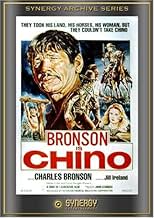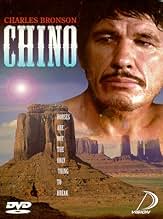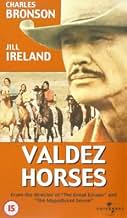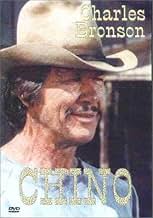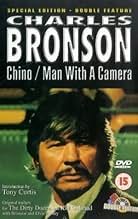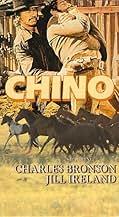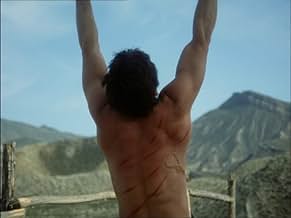IMDb RATING
6.0/10
3K
YOUR RATING
A runaway teenager and a mixed-race horse breeder strike an unlikely friendship in the context of common hardships.A runaway teenager and a mixed-race horse breeder strike an unlikely friendship in the context of common hardships.A runaway teenager and a mixed-race horse breeder strike an unlikely friendship in the context of common hardships.
José Nieto
- Mexican
- (as Jose Nieto)
Diana Lorys
- Mexican
- (scenes deleted)
- (as Diana Loris)
Conchita Muñoz
- Mexican
- (as Conchita Munoz)
Henri Bidon
- Cowboy
- (as Henri Bidon Mikaleffs)
Florencio Amarilla
- Little Bear
- (uncredited)
Annamaria Clementi
- Native American Girl
- (uncredited)
Enrique García Santiago
- Chino's Attacker
- (uncredited)
Eduardo García
- Chino's Attacker
- (uncredited)
Featured reviews
...with some touching moments. From the title you wouldn't expect much, but I liked this film a lot and wonder why it is almost never aired on TV. Bronson and Van Patten have a great chemistry and their on-screen relationship is very believable. The story is simple, with an interesting beginning and a good, plausible ending. The soundtrack is nice, too.
The only thing I would change in this film is to make it longer, add more scenes so we can get to know the characters in various settings, and delve into the background to the conflict between Chino and his neighbors.
I recommend this film, especially to fans of Charles Bronson. I will definitely watch this film again (finally saw it for the first time, after all these years!).
The only thing I would change in this film is to make it longer, add more scenes so we can get to know the characters in various settings, and delve into the background to the conflict between Chino and his neighbors.
I recommend this film, especially to fans of Charles Bronson. I will definitely watch this film again (finally saw it for the first time, after all these years!).
The Valdez Horses (AKA: Chino and Valdez the Halfbreed) is directed by John Sturges and adapted to screenplay by Clair Huffaker from the novel "The Valdez Horses" written by Lee Hoffman. It stars Charles Bronson, Jill Ireland, Marcel Bozzuffi and Vincent Van Patten. Music is by Guido and Maurizio De Angelis and cinematography by Armando Nannuzzi.
Chino Valdez (Bronson), half Indian, half Mexican, lives in solitude on his ranch and beavers away breeding and breaking horses. When one night a 15 year old stray youngster appears at his door looking for bed, board and maybe work, it signals a chain of events that will ultimately define the both of them.
It happens once in a while, a Western fan will observe the mixed notices for a particular genre piece and kind of dismiss it as being far from essential viewing, even if it happens to star an actor you greatly enjoy. "The Valdez Horses" is a beautiful Western, a thoughtful and reflective genre piece that seems to have been damned by those who got a completely different Bronson movie to the one they were hoping for. Regardless of the question of just how much directing John Sturges actually did on the picture (it's rumoured Italian Duilio Coletti did most of the work), the end result is a mature and engaging piece of entertainment.
It's a film that belongs in the company of "Monte Walsh", "Will Penny" and "Lonely Are the Brave", films that feature a macho male protagonist at odds with what is happening around him. In Chino Valdez's case, he's a loner, he likes a drink and he's constantly having to defend himself against the racists down in the town. He's at his happiest when it's just him and his horses, man and beast clearly understand each other. But when young Jamie Wagner (Patten) arrives in Chino's life, the equilibrium is upset, but in a good way, two lost souls finding a family foothold that both thought beyond them.
Yet there is of course a villain of the piece, Maral (Bozzuffi), an all domineering land baron who has absolutely no time of day for the halfbreed horse tamer. Things are further complicated when Maral's half sister comes to town, Catherine (Ireland) is prim and proper British, and immediately there's an attraction between her and Chino, there is just no way Maral is going to sit back and let a relationship develop there. A shame because Chino and Catherine benefit each other greatly, but the vile stink of hatred hovers over them like a black cloud waiting to unload its miserable cargo.
Some old reviews for the film claim its a series of un-cohesive scenes strung together! That really isn't the case at all, the trajectory very much builds towards the next stage of Chino and Jamie's life. Chino introduces Jamie to an Indian tribe, spending time with them and their way of life, even as he ruefully remarks to his young charge that they are a dying breed, there's a proud sheen to Chino that's most telling. Chino also takes him out for Xmas celebrations in town with the Mexicans, the young man clearly has never been so happy as he gets shown by Chino that not all the West is rife with bile. While elsewhere, all the scenes with the horses, the breaking in, the riding, the stare downs, are superbly filmed and emphasise the narrative's point of Jamie's further education.
There's some violence, it would after all be a shame to waste Bronson in that way, but this is no "Chato's Land" and newcomers to the film should be forewarned that it isn't a shoot em' up/fist fights rampage movie. In fact the ending is most unconventional and sure to leave some very frustrated. I know that I was initially, but a couple of hours later as I sat down with a glass of wine I pondered on how daring and poignant it was, a real bitter-sweet finale that deftly has you re-evaluating the whole point of the movie. Lovely scenery (Almeria, Spain) helps put the cherry on the cake, and with Bronson on fine form and his chemistry with Ireland and Patten set in stone, this is a far better picture than you may have heard it is. 8/10
Chino Valdez (Bronson), half Indian, half Mexican, lives in solitude on his ranch and beavers away breeding and breaking horses. When one night a 15 year old stray youngster appears at his door looking for bed, board and maybe work, it signals a chain of events that will ultimately define the both of them.
It happens once in a while, a Western fan will observe the mixed notices for a particular genre piece and kind of dismiss it as being far from essential viewing, even if it happens to star an actor you greatly enjoy. "The Valdez Horses" is a beautiful Western, a thoughtful and reflective genre piece that seems to have been damned by those who got a completely different Bronson movie to the one they were hoping for. Regardless of the question of just how much directing John Sturges actually did on the picture (it's rumoured Italian Duilio Coletti did most of the work), the end result is a mature and engaging piece of entertainment.
It's a film that belongs in the company of "Monte Walsh", "Will Penny" and "Lonely Are the Brave", films that feature a macho male protagonist at odds with what is happening around him. In Chino Valdez's case, he's a loner, he likes a drink and he's constantly having to defend himself against the racists down in the town. He's at his happiest when it's just him and his horses, man and beast clearly understand each other. But when young Jamie Wagner (Patten) arrives in Chino's life, the equilibrium is upset, but in a good way, two lost souls finding a family foothold that both thought beyond them.
Yet there is of course a villain of the piece, Maral (Bozzuffi), an all domineering land baron who has absolutely no time of day for the halfbreed horse tamer. Things are further complicated when Maral's half sister comes to town, Catherine (Ireland) is prim and proper British, and immediately there's an attraction between her and Chino, there is just no way Maral is going to sit back and let a relationship develop there. A shame because Chino and Catherine benefit each other greatly, but the vile stink of hatred hovers over them like a black cloud waiting to unload its miserable cargo.
Some old reviews for the film claim its a series of un-cohesive scenes strung together! That really isn't the case at all, the trajectory very much builds towards the next stage of Chino and Jamie's life. Chino introduces Jamie to an Indian tribe, spending time with them and their way of life, even as he ruefully remarks to his young charge that they are a dying breed, there's a proud sheen to Chino that's most telling. Chino also takes him out for Xmas celebrations in town with the Mexicans, the young man clearly has never been so happy as he gets shown by Chino that not all the West is rife with bile. While elsewhere, all the scenes with the horses, the breaking in, the riding, the stare downs, are superbly filmed and emphasise the narrative's point of Jamie's further education.
There's some violence, it would after all be a shame to waste Bronson in that way, but this is no "Chato's Land" and newcomers to the film should be forewarned that it isn't a shoot em' up/fist fights rampage movie. In fact the ending is most unconventional and sure to leave some very frustrated. I know that I was initially, but a couple of hours later as I sat down with a glass of wine I pondered on how daring and poignant it was, a real bitter-sweet finale that deftly has you re-evaluating the whole point of the movie. Lovely scenery (Almeria, Spain) helps put the cherry on the cake, and with Bronson on fine form and his chemistry with Ireland and Patten set in stone, this is a far better picture than you may have heard it is. 8/10
This Italian/Spanish/French co-production concerns a mestizo , Chino Valdez (Bronson at fifty-one years of age), the Halfbreed , he's a horse breeder rancher who struggles to maintain his way of life by facing off foes. 'The Valdez Horses' refers to Chino's equine herd . The half-Indian man lives solitary until the arrival a young (Vincent Van Patten) . Chino decides to take him in and teach him the art of rodeo , raising , breeding and round-up horses . The movie follows the Bronson's adventures and his imposing black stallion that represents freedom and proud what the white men impede him to enjoy. Meanwhile , Chino has a sensitive romance, as he falls in love with the sister (Jill Ireland) of a wealthy owner (Marcel Bozzuffi) who doesn't approve the relationship and taking the subsequent vengeance. Bronson is Valdez!...and around Valdez things erupt. They Took His Land... His Horses... His Woman... But... They Couldn't Take Chino!
It is a Spaghetti Western shot in Almeria (Spain) where by that time lots of Maccaroni/Paella Westerns were shot , and its source 'The Valdez Horses' , a novel written by Lee Hoffman (published in 1967) ; but being a little bit boring and slow-moving , although there are some shootouts, action , and excitement enough. It even turns out to be quite advanced for its time, due to its ecological content, being an ode to the land and wild animals; its political correctness in the treatment of the Indians is also worthy of praise.
Interesting storyline though monotonous and tiring , at times, by Clair Huffaker , he was a prestigious screenwriter who wrote several notorious westerns. Clair Huffaker is credited as the sole writer on American prints , though in the Italian ones is also signed by Massimo De Rita and Arduino Maiuri . There's a brief exploring about Native American Indians and dream sequences that tend to undermine the easy action. As usual, Charles Bronson is a convincingly silent tough guy, here playing Chino Valdez, a mix of Native American Indian/white European ancestry, a horse breeder who domesticates and trains horses ; while Jill Ireland (Bronson's real wife) , as his sweetheart , is enjoyable and enticing . This film is one of Charles Bronson's 70s westerns , his westerns made during the seventies include Red sun (1971) by Terence Young , Chato (1972) by Michael Winner , From noon till three (1976) by Frank D Gilroy , Nevada Express (1975) by Tom Gries and White Buffalo (1977) by J. Lee Thompson , being most of them produced by Dino De Laurentiis. Spectacular outdoors well shown by cameramen Armando Nannuzzi and Godofredo Pacheco. Set in New Mexico , USA , this movie was actually filmed in Almería , desert of Tabernas , Andalucía , Spain . Musical score by Guido and Maurizio De Angelis is effective, stirring and evocative , they are composers of numerous spaghetti western soundtracks .
Weak though slick direction by John Sturges, he previously made classic westerns as ¨Gunfight OK Corral¨, ¨Last train from Gun Hill¨ and ¨The magnificent seven¨ and his former Western film had been ¨Joe Kidd¨ with Clint Eastwood . Being fifth and ending film that filmmaker Sturges made with star Charles Bronson . This Italian/Spanish/French co-production was premiered in Europe in 1973 but didn't open in the USA until 1976. In the Italian version appears credited as co-director Duilio Coletti. Duilio was a good craftsman who mainly filmed adventure genre such as ¨Captain Fracassa¨, ¨Il Fornaretto Di Venezia¨, The Mask of Cesare Borgia" , "Merchant of Slaves" and wartime genre , such as ¨Anzio¨ co-directed by Edward Dymitryck , ¨Divisione Folgore¨, "The Earth Cries Out" , "Hell Raiders of the Deep" , and ¨Under ten flags¨ . The motion picture is a Charles Bronson vehicle along with his wife, Jill Ireland , both of whom sadly deceased . Despite having little fame in the past, and having been somewhat hidden and obscure, the film has improved over time, thanks above all to recent remasterings, compared to old, poorly worn prints from a 'public domain', and is today better regarded, which is why it is highly recommended for lovers of the genre. Rating: 6/10. Acceptable and passable, but not remarkable.
It is a Spaghetti Western shot in Almeria (Spain) where by that time lots of Maccaroni/Paella Westerns were shot , and its source 'The Valdez Horses' , a novel written by Lee Hoffman (published in 1967) ; but being a little bit boring and slow-moving , although there are some shootouts, action , and excitement enough. It even turns out to be quite advanced for its time, due to its ecological content, being an ode to the land and wild animals; its political correctness in the treatment of the Indians is also worthy of praise.
Interesting storyline though monotonous and tiring , at times, by Clair Huffaker , he was a prestigious screenwriter who wrote several notorious westerns. Clair Huffaker is credited as the sole writer on American prints , though in the Italian ones is also signed by Massimo De Rita and Arduino Maiuri . There's a brief exploring about Native American Indians and dream sequences that tend to undermine the easy action. As usual, Charles Bronson is a convincingly silent tough guy, here playing Chino Valdez, a mix of Native American Indian/white European ancestry, a horse breeder who domesticates and trains horses ; while Jill Ireland (Bronson's real wife) , as his sweetheart , is enjoyable and enticing . This film is one of Charles Bronson's 70s westerns , his westerns made during the seventies include Red sun (1971) by Terence Young , Chato (1972) by Michael Winner , From noon till three (1976) by Frank D Gilroy , Nevada Express (1975) by Tom Gries and White Buffalo (1977) by J. Lee Thompson , being most of them produced by Dino De Laurentiis. Spectacular outdoors well shown by cameramen Armando Nannuzzi and Godofredo Pacheco. Set in New Mexico , USA , this movie was actually filmed in Almería , desert of Tabernas , Andalucía , Spain . Musical score by Guido and Maurizio De Angelis is effective, stirring and evocative , they are composers of numerous spaghetti western soundtracks .
Weak though slick direction by John Sturges, he previously made classic westerns as ¨Gunfight OK Corral¨, ¨Last train from Gun Hill¨ and ¨The magnificent seven¨ and his former Western film had been ¨Joe Kidd¨ with Clint Eastwood . Being fifth and ending film that filmmaker Sturges made with star Charles Bronson . This Italian/Spanish/French co-production was premiered in Europe in 1973 but didn't open in the USA until 1976. In the Italian version appears credited as co-director Duilio Coletti. Duilio was a good craftsman who mainly filmed adventure genre such as ¨Captain Fracassa¨, ¨Il Fornaretto Di Venezia¨, The Mask of Cesare Borgia" , "Merchant of Slaves" and wartime genre , such as ¨Anzio¨ co-directed by Edward Dymitryck , ¨Divisione Folgore¨, "The Earth Cries Out" , "Hell Raiders of the Deep" , and ¨Under ten flags¨ . The motion picture is a Charles Bronson vehicle along with his wife, Jill Ireland , both of whom sadly deceased . Despite having little fame in the past, and having been somewhat hidden and obscure, the film has improved over time, thanks above all to recent remasterings, compared to old, poorly worn prints from a 'public domain', and is today better regarded, which is why it is highly recommended for lovers of the genre. Rating: 6/10. Acceptable and passable, but not remarkable.
After directing Clint Eastwood in the western caper "Joe Kidd (1972)" (which I really like), the following year director John Sturges' helm the European western "Chino (1973)" that starred Charles Bronson. However these two films share very little in common. Sturges ably directs, but this one relies heavily on Bronson's presence and the unusual way things go on to play out in this very fragmented story. Nonetheless I didn't find it to be like your standard western / spaghetti item. It was broodingly slow, and the action saw very little to no daylight. It had a strange emotional and at times spiritual pull (like a stirring dream sequence) between the characters, that kind of made it unpredictable and primarily dreary. The material never sticks to one story, but moves about quite a bit in a typically mellow and subdued fashion. More often it focused on the convincingly growing relationship between Bronson and Van Patten, and their laboured effort on the ranch. Some of these plots don't add anything to the central idea, but still manages to compel (while not be completely satisfying) by giving the main characters some personality and weight. Bronson's performance bares someone who's genuine, and with a manner that still intimidates, but can show that warm side with not a care in the world to get into any sort of conflict. The unhinged ending beautifully paints that angle. Quite a curious turn on his part. Working alongside him was an exceptional show-in by Vincent Van Patten and his fellow squeeze at the time Jill Ireland provided some fire to the chemistry. Sturges simply knows how get striking location choices in the framing, and cinematographer Armando Nanuzzi formulates it accordingly with the on-screen action. Although the thing that hit me was Guido and Maurizio De Angelis' folksy casual music score of soothing attraction and swing. Creaky, but oddly intriguing little-known western.
"Chino" had such potential. It was directed (partially) by the great John Sturges and its star, Charles Bronson, gives a wonderful performance, exuding the kind of quiet masculine strength that no one in Hollywood has these days. Most of the complaints about the film have to do with its atypically downbeat ending. I won't spoil it for you, but I will say that I thought the ending, though viscerally unsatisfying, was intellectually and emotionally appropriate, more along the lines of something you'd read in a novel than see in a pop movie.
But what really goofs the film up is the see-saw realism brought about by being directed by two different men, the ailing Hollywood icon Sturges, and Duilio Coletti, unknown in the states, who may have been even further down the slope of his career in Europe. Formalist Sturges strove for at least the inner-logic of "movie reality." Coletti's work had devolved into the worst of sloppy Eurowesterns.
Parts of the film seem to strive for realism, using natural lighting effects, etc. But as the film progresses, more and more glaring anachronisms pop up, such as perfectly square hay bales, only possible with baling machines. This break with even a third-grader's knowledge of the old west reaches its zenith when a character burns down a house, using a PLASTIC JUG of kerosene. A PLASTIC JUG in the old west! Hard to believe that even a European wouldn't know that there was no plastic in those days. I don't know what the circumstances were behind Sturges either quitting or being fired from the director's chair part-way through the filming of "Chino," but it certainly seems as though the scenes he left missing were shot by Coletti as quickly and with as little thought as possible.
The film is also hobbled a bit by it's international origins. The villian is obviously French while his sister, played by Jill Ireland, is obviously British. Ireland has a brief bit of dialoge explaining this, but it only leaves you scratching your head all the more. Otherwise, "Chino" has many wonderful segments, thoughtful and well-acted.
As a postscript: I wish someone would restore this and other of Bronson's more unusual Euro flicks and make them available on high quality widescreen dvd. The currently available vhs and dvd versions of Chino, Red Sun, Honor Among Theives, Cold Sweat, You Can't Win 'Em All, and etc, all suck bigtime. MGM? Anchor Bay? HELLO?
But what really goofs the film up is the see-saw realism brought about by being directed by two different men, the ailing Hollywood icon Sturges, and Duilio Coletti, unknown in the states, who may have been even further down the slope of his career in Europe. Formalist Sturges strove for at least the inner-logic of "movie reality." Coletti's work had devolved into the worst of sloppy Eurowesterns.
Parts of the film seem to strive for realism, using natural lighting effects, etc. But as the film progresses, more and more glaring anachronisms pop up, such as perfectly square hay bales, only possible with baling machines. This break with even a third-grader's knowledge of the old west reaches its zenith when a character burns down a house, using a PLASTIC JUG of kerosene. A PLASTIC JUG in the old west! Hard to believe that even a European wouldn't know that there was no plastic in those days. I don't know what the circumstances were behind Sturges either quitting or being fired from the director's chair part-way through the filming of "Chino," but it certainly seems as though the scenes he left missing were shot by Coletti as quickly and with as little thought as possible.
The film is also hobbled a bit by it's international origins. The villian is obviously French while his sister, played by Jill Ireland, is obviously British. Ireland has a brief bit of dialoge explaining this, but it only leaves you scratching your head all the more. Otherwise, "Chino" has many wonderful segments, thoughtful and well-acted.
As a postscript: I wish someone would restore this and other of Bronson's more unusual Euro flicks and make them available on high quality widescreen dvd. The currently available vhs and dvd versions of Chino, Red Sun, Honor Among Theives, Cold Sweat, You Can't Win 'Em All, and etc, all suck bigtime. MGM? Anchor Bay? HELLO?
Did you know
- TriviaFinal western of director John Sturges.
- GoofsIn the early bar fight, one of the stuntmen coming at Chino with a chair tosses his head back a good half second before being hit.
- Quotes
Chino Valdez: That's the way Indians bury their dead. They'd rather be close to the sun than have dirt thrown in their faces.
- ConnectionsFeatured in Charles Bronson, le génie du mâle (2020)
- SoundtracksFreedown rainbow
Composed by Guido De Angelis and Maurizio De Angelis
- How long is Chino?Powered by Alexa
Details
Contribute to this page
Suggest an edit or add missing content




